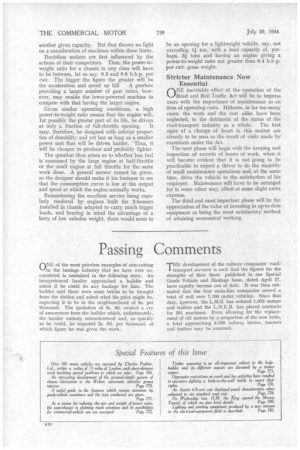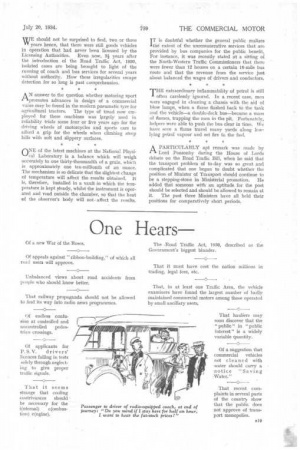Special Features of this Issue
Page 32

Page 33

If you've noticed an error in this article please click here to report it so we can fix it.
Over 100 motor vehicles are operated by Charles Poulter, Ltd., within a radius of IS miles of London, such short-distance work involving special problems to which we refer. Page 766.
An interesting development of the grouped-nipple system of chassis lubrication is the Welson automatic selective grease injector. Page 770. A useful guide to the features which receive attention by goods-vehicle examiners and the tests conducted are given. Page 771. As a means for redwing the size and weight of power units, the supercharger is claiming muds attention and its possibilities
for commercial-vehicle use are surveyed. Page 772.
Timber seasoning is an all-important subject to the bodybuilder and its different aspects are discussed by a timber
expert. Page 775. Oppressive restrictions on coach and bus activities have resulted in operators fighting a back-to-the-wall battle to assert their rights. Page 776. An Austin 0-8-cwt. van displayed sound characteristics when subjected to our standard road test. Page 778. On Wednesday last, 1-1.M. the king opened the Mersey Tunnel, of which we give brief details. Page 780. Lighting and starting equipment, produced by a new entrant to the electrical-equipment field is described. Page 785. WE should not be surprised to find, two or three VY years hence, that there were still goods vehicles in operation that had never been licensed by the Licensing Authorities. Even now, 34 years after the introduction of the Road Traffic Act, 1930, isolated cases are being brought to light of the running of coach and bus services for several years without authority. How these irregularities escape detection for so long is past comprehension.
AN answer to the question whether motoring sport promotes advances in design of a commercial value may be found in the modern pneumatic tyre for agricultural tractors. The type of tread now employed for these machines was largely used in reliability trials some four or five years ago for the driving wheels of motorcycles and sports cars to afford a grip for the wheels when climbing steep hills with soft and slippery surfaces.
ONE of the latest machines at the National Physical Laboratory is a balance which will weigh accurately to one thirty-thousandth of a grain, which is approximately one ten-millionth of an ounce. The mechanism is so delicate that the slightest change of temperature will affect the results obtained, it is, therefore, installed in a vault in 'which the temperature is kept steady, whilst the instrument is operated and read outside the chamber, so that the heat of the observer's body will not., affect the results.
I T is doubtful whether the general public realizes the extent of the unremunerative services that are provided by bus companies for the public benefit, For instance, it was recently stated at a sitting of the North-Western Traffic Commissioners that there were fewer than 12 houses on a certain 10-mile bus route and that the revenue from the service just about balanced the wages of drivers and conductors.
THE extraordinary inflammability of petrol is still often carelessly ignored. In a recent case, men were engaged in cleaning a chassis with the aid of blow lamps, when a flame flashed back to the tank arid the vehicle—a double-deck bus—became a mass of flames, trapping the men in the pit. Fortunately, helpers were able to push the bus clear in time. We have seen a flame travel many yards along lowlying petrol vapour and set fire to the fuel.
A PARTICULARLY apt remark was made by I-1 Lord Ponsonby during the House of Lords debate on the Road Traffic Bill, when he said that the transport problem of to-day was so great and complicated that one began to doubt whether the position of Minister of Transport should continue to be a stepping-stone in Ministerial promotion. He added that someone with an aptitude for the post should be selected and should be allowed to remain at it. The past three Ministers have all held their positions for comparatively short periods.




























































































